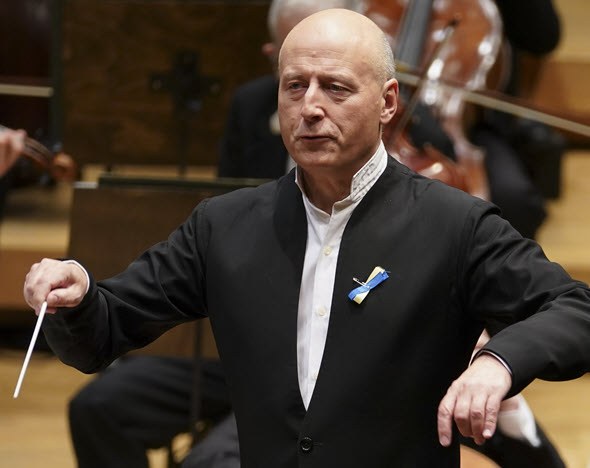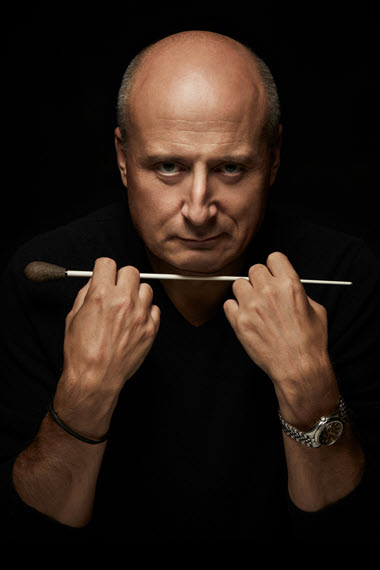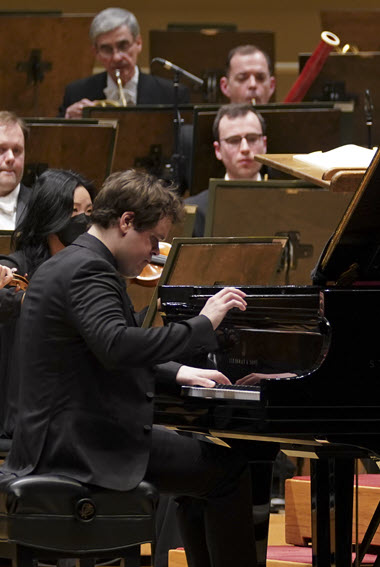Paavo Järvi, his musical French impeccable, leads CSO in stylish ‘Symphonie fantastique’

Paavo Järvi wore a Ukraine remembrance ribbon when he conducted the Chicago Symphony. (Concert photos by Nuccio DiNuzzo)
Review: Chicago Symphony Orchestra conducted by Paavo Järvi, at Orchestra Hall.
By Lawrence B. Johnson
In the art of conducting, stylistic sensibility is an ineffable attribute, elusive but also telling. Its absence tends to be conspicuous, and its presence can transform mere correctness into something singular and marvelous – something like the Estonian-American conductor Paavo Järvi conjured in Berlioz’s “Symphonie fantastique” with the Chicago Symphony Orchestra on March 5 at Orchestra Hall.
Järvi acquired his French musical fluency through a sort of cultural immersion. For six seasons, from 2010-16, he served as music director of the Orchestre de Paris. He is indeed quite an internationalist, currently music director of both the Tonhalle Orchestra in Zurich and the Deutsche Kammerphilharmonie; this season he’s also winding up a seven-year stint as chief conductor of the NHK Symphony in Tokyo. Although Järvi has conducted the Chicago Symphony several times, this was the 59-year-old maestro’s first visit since 2009. I daresay we have been missing a lot.
In a word, Järvi’s excursion through Berlioz’s tempestuous dream of a symphony – and the orchestra’s keen-edged performance of it – was magical. It was one of those revelatory experiences where you think you know a core work of the repertoire pretty well, and then someone comes along to cast it in a penetrating new light. Such was Järvi’s account, by turns gossamer and mysterious and feverish and wild.
The “Symphonie fantastique” is one wild ride, the psychedelic drug-induced trip of a distraught lover – or in less fanciful terms, a symphonic poem in five movements that takes Romantic self-indulgence to the edge, and then over. All that said, however, Berlioz’s craftsmanship, his mastery of the possibilities of the orchestra and his imaginative narrative, only grow more striking the more closely one attends to the details. Järvi gave the impression of having subsumed those details into his own fiber and breath.
After the turbulence of the opening tableau’s “Dreams and Passions,” Järvi summoned both the splendor and the consummate delicacy of the ensuing ball; and everywhere, the Chicago Symphony invoked these images through finely gauged colors, textures and rhythms. The pivotal third movement, a pastoral scene, displayed Järvi’s almost daring patience in allowing the picture to form slowly, from the exquisitely mournful call and response of English horn (Scott Hostetler) and off-stage oboe (Lora Schaefer) through a rising storm and back to final quiescence in the original distant dialogue reprised. At every turn, in every expressive inflection, Järvi illuminated the sheer finesse of music that can too easily be painted with the glibness of a broad brush.
With the last two movements, a march to the scaffold and the mad dream of a witches’ sabbath, Järvi unleashed the fury of gathered timpani and brasses. The dark, twisted sabbath invoked a hellish rage that may have left our tossing insomniac exhausted but pulled a delirious audience from their seats and into noisy approval.
I’m afraid that every time I hear one of the Chopin piano concertos, I’m reminded of the legendary conductor George Szell’s assessment of those works as concertos without orchestra. On this occasion, the pianist with the happy assignment of the keyboard part In the Piano Concerto No. 2 in F minor was Benjamin Grosvenor, who played with confidence and poetic grace.
I should like to hear this masterful British pianist play Chopin in a recital, without the encumbrance of a Chopinesque orchestra. Watching the superb CSO strings dutifully bowing through their simplistic part, I thought of the musical “Oklahoma!” and Ado Annie’s wry observation about the cowboy’s loneliness, with only his pony for companionship: “I sure am feelin’ sorry for the pony.”



